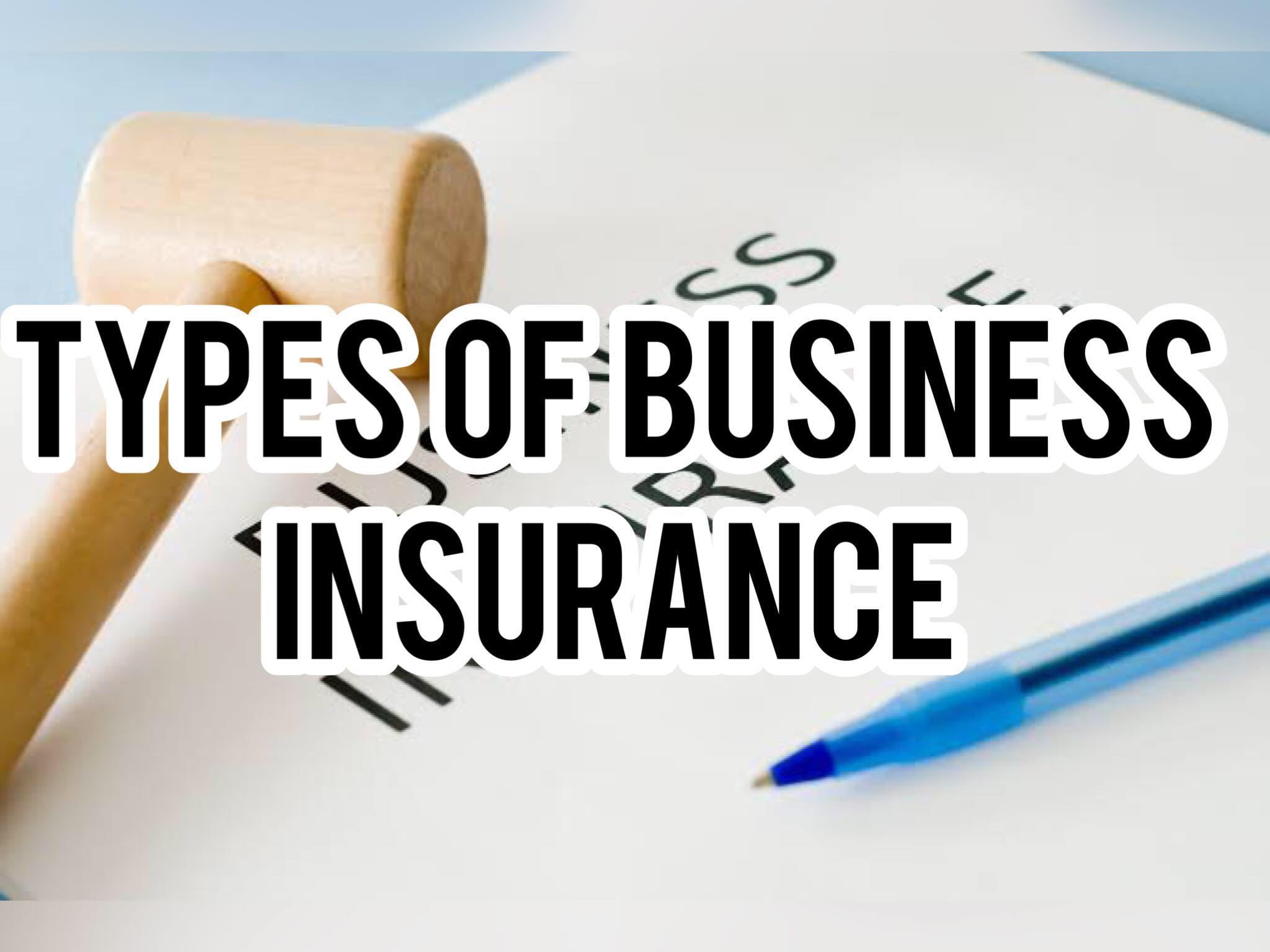Business insurance, commonly referred to as commercial insurance, protects companies from financial losses resulting from unanticipated occurrences during routine company activities, such as litigation, accidents, or natural disasters.
You can utilize insurance to safeguard your company against a number of risks. It might be easier to decide which coverage alternatives you might require if you are aware of how each type of business insurance (also known as commercial insurance) functions. The following list includes some of the popular types of business insurance plans:
What Are The Types of Business Insurance?
There are different types of business insurance. They include:
1. General Liability Insurance
If your company is sued, general liability insurance offers liability protection. This kind of coverage is pretty thorough and may shield you against lawsuits resulting from a variety of different situations.
What dangers does it guard against? Your general liability insurance shields you from claims made by clients or suppliers who are not affiliated with your business.
What expenses does it pay for? This kind of insurance can pay for court fees, claimant settlements, and medical costs associated with personal injury lawsuits.
2. Commercial Property Insurance
Your company’s property is covered by commercial property insurance against a number of damages. For instance, if a natural catastrophe or civil disturbance damages your property, your policy can cover the cost of replacing or repairing the destroyed property.
What dangers does it guard against? Commercial property insurance covers damage brought on by civil disobedience, vandalism, wind, hail, and fire.
3. Business Income Insurance
A form of insurance called business income insurance is intended to be used in addition to commercial property insurance. This type of insurance covers you in the event that property damage prevents you from earning money for your company.
What dangers does it guard against? Business income insurance guards you against lost revenue brought on by a delay or cessation of operations due to property damage.
What expenses does it pay for? This kind of insurance coverage aids in restoring lost operational revenue.
4. Professional Liability Insurance
Professional liability insurance protects you against financial damages due to alleged errors you committed while performing your duties. To complement any occurrences that a general liability policy does not cover, you might get this kind of insurance.
What dangers does it guard against? Legal actions that can be brought about as a result of carelessness, misconduct, or mistakes can be shielded from by professional liability insurance.
What expenses does it pay for? Benefits under this kind of insurance can be used to pay for court costs and settlements.
5. Workers’ Compensation Insurance
Workers’ compensation insurance is a sort of liability protection for your company in the event that one of your employees is hurt at work. What kinds of companies are required to have workers’ compensation insurance depends on state legislation.
What dangers does it guard against? Injuries sustained while working are covered by workers’ compensation insurance.
What expenses does it pay for? This kind of insurance can cover medical expenses for hurt workers and replace their income until they can start working again.
Also Read: Best Homeowners Insurance Review 2023
6. Employment Practices Liability Insurance
With the help of employment practices liability insurance, you may shield your company against allegations of improper hiring and employment practices-related litigation. Your coverage may cover legal costs or settlements if you are sued.
What dangers does it guard against? Legal actions involving wrongful termination, discrimination, sexual harassment, and retaliation can all be covered by employment practices liability insurance.
What expenses does it pay for? Legal bills and settlements may be covered by this kind of insurance.
7. Product Liability Insurance
Businesses that manufacture or produce physical things are covered by product liability insurance. This insurance specifically protects against claims involving faulty items that result in harm or injury.
What dangers does it guard against? When a customer sues you for a defective product that has resulted in injury, property damage, or death, product liability insurance safeguards your company.
What expenses does it pay for? Legal bills and settlements may be covered by this kind of insurance.
8. Commercial Auto Insurance
Although it is intended to cover commercial cars, commercial auto insurance functions similarly to personal auto insurance. States may have different requirements for coverage types and coverage limitations.
What dangers does it guard against? You are covered by commercial auto insurance in the event that corporate vehicles are stolen, vandalized, or suffer other damage.
What expenses does it pay for? This kind of insurance can pay for settlements, medical expenses, repair charges, and legal fees.
9. Commercial Umbrella Insurance
Commercial umbrella insurance is intended to protect against hazards that other commercial insurance policies do not. An umbrella insurance, for instance, might fill up the gaps if you are sued and your general liability policy’s coverage limitations have been reached.
What dangers does it guard against? Commercial umbrella insurance can assist you in reducing financial losses brought on by settlements from legal actions that are greater than the limits of other commercial insurance coverage.
What expenses does it pay for? This kind of insurance covers settlements and court costs.
10. Cyber Liability Insurance
The purpose of cyber liability insurance, commonly referred to as cybersecurity insurance, is to protect against liability and damage losses resulting from the transmission or sharing of data electronically. As more organizations are attacked online by hackers and identity thieves, this kind of insurance is becoming more and more crucial.
What dangers does it guard against? In the event that any electronic or digital data is lost, stolen, or otherwise compromised, cybersecurity insurance can shield your company.
What expenses does it pay for? This kind of insurance can pay for the cost of maintaining or updating cybersecurity systems as well as liability protection against litigation.
How To Pick The Best Business Insurance Plan
It’s crucial to get the appropriate business insurance since you don’t want to underinsure or overpay for covering specific parts of your company. You can assess your requirements more accurately by asking the appropriate questions.
The following are a few of the most important questions to answer:
- How many people work for the company?
- Does the company operate just online, or does it also have a physical location?
- Do any pieces of company equipment require insurance?
- Which liability concerns does the company face?
- Which cars will require coverage, if any?
- What would happen if a natural calamity or another event beyond of my control forced a halt to business?
- Will I require insurance to cover unique circumstances? For instance, if I intend to sell or pass the firm on to my heirs, do I need to get key person insurance?
When deciding on insurance alternatives, it’s a good idea to consider other considerations. For instance, you’ll probably need to consider how much liability insurance is necessary or what kind of rates your company can afford.
Also take into account any coverage requirements imposed by your state’s laws or the sector in which you work. For instance, having professional liability insurance may be essential for those who operate in the financial services industry.
Also Read: Auto Insurance: Best Review In 2023
How to Obtain Business Insurance
Knowing what to expect is helpful if you’re prepared to buy business insurance. Similar steps are used when purchasing other forms of insurance. Here are the steps for purchasing business insurance.
1. Evaluation of Business Risk
Which forms of business insurance you might require might be determined by the types of risk variables that impact your company. Let’s use the example of running an HVAC repair company. Eight of your ten workers drive work vans to clients’ residences or places of business. It would be sensible to have a commercial car coverage in place to cover those vehicles in such situation.
What if you operate your firm alone and have no employees? If you drive your own car to work and are protected by personal auto insurance, you might not need an auto coverage. Also, it’s possible that workers’ compensation insurance is not required. You may focus on the sorts of insurance coverage that may be necessary and what you can go without by seeing your company through the lens of risk.
2. Know What Is Covered
You need to be aware of the various kinds of company insurance by now. Knowing these two things will assist when creating a policy:
- What’s covered
- What’s excluded
If you need to submit a claim and discover that there is a coverage gap, you don’t want to be caught off guard. With the assistance of an agent or broker, you may review the specifics of a business insurance policy and identify any potential flaws that could expose your company to risk.
3. Compare Business Insurance Quotes
Business insurance is provided by several organizations, and each one charges a different premium. The primary cost factors for business insurance are the premiums you’ll pay and the deductible you’ll have to pay in the event of a claim.
Obtaining a single quotation is a wonderful place to start, but having more quotes to compare it to is beneficial. To have a better understanding of the pricing range you’re dealing with, it may be a good idea to obtain at least three estimates for business insurance.
Request quotations for each policy if you’re purchasing more than one to meet various needs. Consider getting estimates for individual policies and comparing them to the cost of business insurance bundles to determine if you can save any money by combining.
When do I need business insurance?
In general, if you’re worried about the prospect of financial losses due to liability claims or other occurrences, you require business insurance. If you don’t have the right insurance, you might suffer a significant financial blow in the event that you are held liable for damages. If business insurance is required by law in the state where you conduct business, you could also need it.
Should I Purchase Individual Policies Or a Combined Package Of Business Insurance?
Selecting standalone coverage may make sense if you simply require one or two forms of company insurance. On the other hand, buying a business insurance package or bundle may be more advantageous if you’re searching for more complete coverage. If you can get numerous policies at a discount, purchasing insurance in a bundle may be more cost-effective.
What Type of Business Insurance Would I Need if I Worked Remotely?
Even if you work from home, you still need business insurance. It could be wise to obtain general liability insurance, at the very least. If any company equipment you use while working from home is crucial to your operations, you may also wish to buy insurance to protect it.
Conclusion
In the worst-case situation, business insurance may be quite helpful if you need to make a claim. You may choose the policy or policies that are most suited to your needs by taking the time to compare the various forms of business insurance. The next step is to compare rates from the top small business insurance providers after you are aware of the coverage you require.

Sage is a financial/consumer journalist and senior editor, personal finance, of TrendsHQ. EXPERTISE: Personal Finance, Careers, Jobs, Scholarships, and Entertainment.
